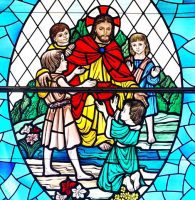ABOUT THE EPC
Our name describes us well. The EPC is both evangelical and Presbyterian. We are evangelical in our zeal for the gospel, as well as evangelism, missions, and living obediently as followers of Jesus. At the same time, we are rooted deeply in the Protestant Reformation and especially the theological and pastoral work of John Calvin. We embrace the Westminster Confession of Faith as our doctrinal standard, and the rule of spiritually mature elders linked together regionally as the best way to guide local congregations.
When the EPC started in 1981, we determined that we would not disagree on the basic essentials of the Christian faith, but on anything that was not essential—such as the issue of ordaining women as officers or practicing charismatic gifts—we would give each other liberty. Above all, we committed ourselves to loving each other and not engaging in quarrels and strife. The result is that when we get together in our regional and national meetings, we spend most of our time in worship and fellowship and almost none in arguing with each other.
The EPC consists of more than 600 churches with approximately 145,000 members. We have a world missions program with a priority on sending missionaries to unreached people groups. We are eager to plant churches across the United States and especially in urban communities and college towns. Our desire is that every one of our congregations will be an outpost of the Kingdom, with every member viewing himself or herself as a missionary on a mission.
OUR MISSION
The EPC exists to carry out the Great Commission of Jesus as a denomination of Presbyterian, Reformed, Evangelical, and Missional congregations.
OUR VISION
OUR BELIEFS
The Constitution of the EPC consists of the Westminster Confession of Faith (including the Larger and Shorter Catechisms), the “Essentials of our Faith,” and the Book of Order (comprised of The Book of Government, The Book of Discipline, and The Book of Worship). Of these, we have one confessional standard: the Westminster Confession of Faith and Catechisms. All these documents are subordinate to Scripture, which is “the supreme and final authority on all matters on which it speaks.”From the beginning, we have been a movement of congregations that takes seriously the Bible, the theology of the historic confessions of the faith, and the evangelical fervor of the founders of American Presbyterianism. We envision our local churches to be evangelical and Presbyterian; hence our name. We affirm that the Bible is God’s inspired and infallible Word, and that it contains eternal truth that speaks with authority to our life, doctrine, and mission (2 Timothy 3:16). To ensure that the ideals of faith are easily understood but remain foundational, our core belief is contained in a concise list of essentials. We are Reformed in our understanding of the Bible, which means we aim to be confessional.
Click here for a synopsis of the EPC’s statements on Scripture as recorded in our governing documents.
OUR STRUCTURE
The local church is the primary building block in the EPC. We believe ministry and mission begins with the local church. As Presbyterians, our churches intentionally connect and engage together on a regional basis. We believe that we can better fulfill the mission of God by supporting, helping, and being accountable to each other. Finally, we are committed to an overarching authority called the General Assembly that meets annually and assigns responsibilities to committees, ministries, and dedicated staff to serve the needs of the local church. The ongoing work of the EPC is carried out by the Office of the General Assembly and staff of each ministry.
OUR ANNUAL MEETING
The General Assembly is our annual June event where EPC leaders—Teaching Elders and Ruling Elders—and guests gather to worship, get refreshed and equipped, connect with each other, and decide on actions and issues for the whole EPC. Our 2021 General Assembly will be held at Second Presbyterian Church in Memphis, Tennessee. The ongoing work of the General Assembly is overseen by Permanent Committees and carried out by the Office of the General Assembly and staff of each ministry.
Essentials adopted by RPC~
An expression of the Protestant Reformation led by John Calvin in Switzerland in the 1500s that was subsequently developed by John Knox in Scotland in the same century. Responding to what they saw as a denial of the gospel and the corruption of the Roman church, they called for reform that was explicitly based on the Bible as the authoritative Word of God.While reacting to the abuses of the church in the 16th century, the Reformed wing of the Reformation has roots extending back to Bernard of Clairvaux of the 12th and Augustine of the 4th century. The Reformed movement spread throughout western and northern Europe in the 17th century—the Westminster Confession of Faith was written at mid-century in England.
Our spiritual ancestors came to North America during the 17th century. Francis Makemie, Jonathan Dickinson, and William Tennent were leaders who helped establish the Presbyterian church in North America, where the first presbytery was formed in 1709. A link in our historical chain is Jonathan Edwards, who triggered the First Great Awakening in New England in the mid-18th century.
IN THE BEGINNING
In late 1980, a group of pastors and elders began meeting in St. Louis, Missouri, for prayer and planning. They came from the two mainline Presbyterian denominations at the time, the United Presbyterian Church of the USA (UPCUSA—the “northern church”) and the Presbyterian Church US (PCUS—the “southern church”). These leaders had become increasingly distressed by theological liberalism and institutional resistance to change in their denominations. They wanted to form a Church that took seriously the Bible, the theology of the historic confessions of the faith, and the evangelical fervor of the founders of American Presbyterianism. They envisioned a denomination that was really evangelical and really Presbyterian; hence the name. In addition, the motto, “In Essentials Unity, In Non-essentials Liberty, in All Things Charity; Truth in Love,” was adopted.
IN ESSENTIALS—UNITY
IN NON-ESSENTIALS—LIBERTY
IN ALL THINGS—CHARITY (TRUTH IN LOVE)
A PRESENT AND FUTURE HOPE
The EPC slowly grew throughout the 1980s and 1990s. Most of this growth came from churches departing the mainline Presbyterian bodies. In addition, successful church planting was occurring. The EPC went global in 1987, when churches in Argentina formed a presbytery that joined us. In 2004, this presbytery was released as a national church with which we enjoy fraternal relations.
At the beginning of the new century, a sense of unease and dissatisfaction became evident as leaders concluded that “doing church” in the 21st century was different from doing it in the 20th century. The 2005 General Assembly created a Long Range Planning Committee to explore the future of the denomination. This committee discovered and embraced “missional” as a key element of effective church ministry and outreach in the 21st century. “Missional” was added to the commitments of the EPC in 2009—the EPC is a denomination of Presbyterian, Reformed, Evangelical, and Missional churches.
While the EPC was discussing missional church, the New Wineskins (a renewal group among mainline Presbyterians) was doing the same. In 2006, leaders of the EPC and the New Wineskins met for the first time. What ultimately resulted was the 2007 creation of transitional presbyteries and transitional membership for churches and ministers seeking to depart their current denomination and come to the EPC. In 2007, there were 182 churches with approximately 75,000 members in the EPC. By August 2015, there were 570 churches in the denomination. By July 2019, the EPC had grown to 630 churches with approximately 145,000 members.
We believe that God created the Evangelical Presbyterian Church to be a significant part of His plan for the proclamation of the gospel to the ends of the earth, the expansion of His Kingdom, and the renewal of believers. It is our conviction that, like the ancient Queen Esther, God has brought us together for such a time as this.
For an in-depth history, see Liberty in Non-Essentials: The Story of the Evangelical Presbyterian Church.


